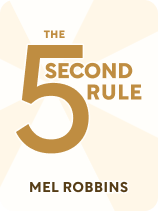

This article is an excerpt from the Shortform book guide to "The 5 Second Rule" by Mel Robbins. Shortform has the world's best summaries and analyses of books you should be reading.
Like this article? Sign up for a free trial here.
What are the benefits of waking up early in the morning? How does getting an early start help you take initiative in life?
Mel Robbins’s book The 5 Second Rule explains that there are three main uses of her Rule: jumping into action, being bold and following your gut, and controlling impulsiveness. But she says you’ll receive the most benefits of the Rule if you get out of bed earlier.
Here are the benefits of waking up early in the morning and how to get an early start.
Benefits of Getting Up Early
Mel Robbins specifically argues you should first use the 5 Second Rule to make yourself get out of bed 30 minutes earlier than you normally would.
(Shortform note: Using this as the first test of the Rule might not be effective for people who struggle to get out of bed for medical reasons—for instance, due to fatigue-related conditions like narcolepsy and chronic fatigue syndrome. For these people, no amount of counting down from five will help them overcome their medical condition. If this sounds like you, you could pick a different first test for the Rule—for instance, motivating yourself to send a difficult email or motivating yourself to work out.)
Robbins explains that there are multiple benefits of waking up early in the morning. First, she points out that there are few factors affecting the test, which means there’s no room for excuses if you fail. Success depends only on your alarm clock sounding and you implementing the Rule: Therefore, if you don’t get out of bed, it’s because you didn’t act when you reached one, and not because something else got in the way.
(Shortform note: When you get rid of external factors to blame for your inaction and take full responsibility for your choices, you may find that you feel worse about yourself if you fail—you might even chastise yourself and tell yourself that you should be doing better. In The Now Habit, Neil Fiore explains that many people try to motivate themselves to act by saying that they “should” be better. This implies that they’re a bad person if they don’t do the right thing, making them feel ashamed; and the shame drains their motivation, making it harder for them to act. Instead of using harmful “should” language that triggers shame, Fiore recommends telling yourself that you “choose to” get out of bed early, or that you “want to” get out of bed early.)
Second, Robbins sees getting out of bed early as a preview of how it feels to apply the Rule. Using the Rule and compelling yourself to act is difficult at first but becomes easier over time. By using the Rule to get out of bed early, you can feel what it’s like to push through this period of struggle (getting out of bed) and reach the point where it’s easy to continue (when you’re up and moving).
(Shortform note: In The Subtle Art of Not Giving a F*ck, Mark Manson offers an explanation as to why actions feel much easier after you start them: because of the inspiration that starting them generates. Manson claims that most people see emotional inspiration as the cause of action—if they don’t feel inspired, they don’t get started. However, he suggests that inspiration is also the result of action: Once you get started on something, that progress often gives you the motivation you need to continue.)
Tips for Using the Rule to Get Out of Bed
Robbins provides two tips for successfully using the Rule to get out of bed. First, put your alarm clock in the room next to your bedroom (close enough that you can still hear it from your bed). When your alarm goes off, use the Rule, get up when you count down to one, then leave the room to turn off the alarm. Doing so discourages you from going back to sleep after your alarm goes off: Once you’re already out of bed, you might as well stay out.
(Shortform note: If you can’t put your alarm clock in another room (perhaps you want to avoid disturbing others, or you live in a one-room apartment), an alternative could be to buy a unique alarm clock designed for heavy sleepers. Examples include a clock on wheels that you have to chase around the room to silence, a dumbbell-shaped clock that makes you do a set of lifts, or even a wristwatch that delivers electric shocks until you rouse yourself with jumping jacks.)
Second, Robbins asserts that you should never hit “snooze” on your alarm clock. Research shows that going back to sleep for 15 minutes after snoozing your alarm triggers a new sleep cycle. The brain can’t complete this cycle in the few minutes of extra sleep you’re getting, and when you get out of bed for good, the part of your brain that controls focus, willpower, and decisions isn’t completely rested due to this interrupted cycle. This makes you feel groggy for up to four hours.
(Shortform note: Even if you don’t actively feel tired and groggy four hours after hitting snooze, it’s likely that you’re still suffering from the ill effects of an interrupted sleep cycle. One study on the groggy experience of “sleep inertia” found that although subjects reported that they felt awake about 40 minutes after getting out of bed, their memory, reaction time, and ability to pay attention were all hampered for up to four hours. When test subjects slept outdoors and synchronized their sleep schedules to the natural cycle of daylight, symptoms of sleep inertia disappeared.)

———End of Preview———
Like what you just read? Read the rest of the world's best book summary and analysis of Mel Robbins's "The 5 Second Rule" at Shortform.
Here's what you'll find in our full The 5 Second Rule summary:
- Why counting down from five to one will help you assert agency over your life
- The different ways you can use the 5-Second Rule
- How to figure out what your passions are and work toward them






